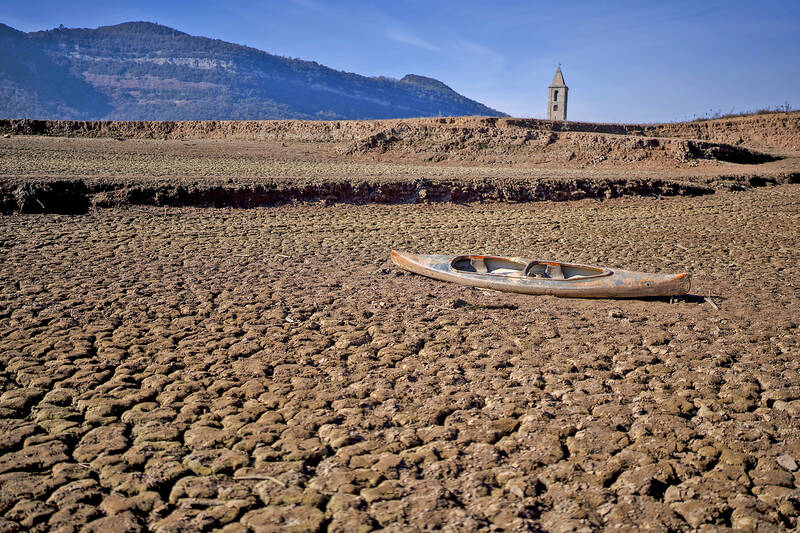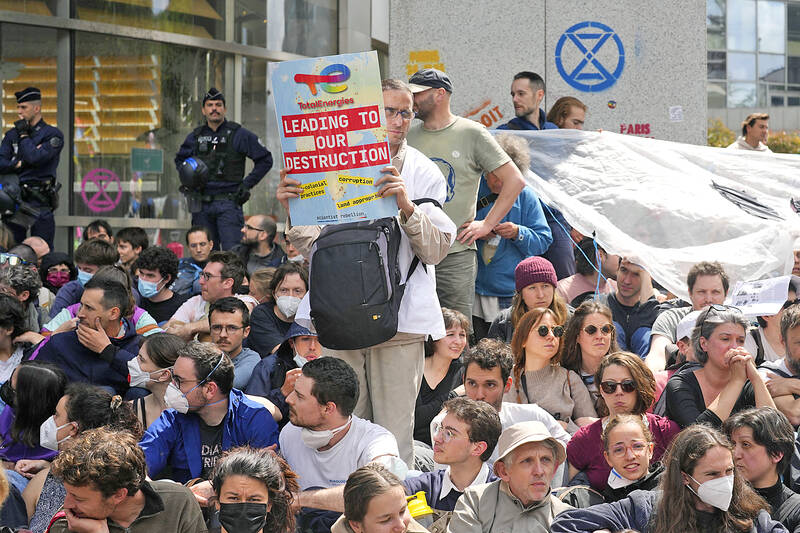The number of climate lawsuits filed against companies around the world is rising swiftly, a report has found, and a majority of cases that have concluded have been successful.
About 230 climate-aligned lawsuits have been filed against corporations and trade associations since 2015, two-thirds of which have been initiated since 2020, according to the analysis published on Thursday by the Grantham Research Institute on Climate Change and the Environment.
One of the most rapidly growing forms of litigation is over “climate-washing” — when companies are accused of misrepresenting their progress towards environmental targets — and the analysis found that 47 such cases were filed against companies and governments last year.

Photo: AP
As climate communications are increasingly scrutinized, there has been a rise in climate-washing litigation, often with positive outcomes for those bringing the cases. Of the 140 climate-washing cases reviewed between 2016 and last year, 77 have officially concluded, 54 of which ended with a ruling in favor of the claimant.
More than 30 cases in 2023 concerned the “polluter pays” principle, whereby companies are held accountable for climate damage caused by high greenhouse gas emissions. The authors also highlighted six “turning off the taps” cases, which challenge the flow of finance to areas which hinder climate goals.
The US accounted for the vast majority of litigation cases filed last year, with 129 cases. The UK was second, with 24 cases while 10 were filed in Brazil.

Photo: AP
Climate litigation cases were filed for the first time in Panama and Portugal last year. This means that 55 countries have now recorded climate cases, with a growing number of litigation cases arising in the global south, which accounts for about 8 percent of all cases.
While the majority of climate litigation cases are still filed against governments, an increasing number are being filed against companies, with an imbalance between the US and the rest of the world — 40 percent of cases outside the US were filed against companies, while in the US just 15 percent of cases involved companies.
The authors cautioned that while “some types of cases, such as government framework cases, have already had lasting impacts on domestic climate governance … the long-term implications of other case types, such as climate-washing cases, remain unclear.”

Photo: AP
A report published by the UN environment program (Unep) and the Sabin Center for Climate Change Law at Columbia University last year highlighted the importance of litigation for climate action around the world.
“Climate litigation … has become an undeniably significant trend in how stakeholders are seeking to advance climate action and accountability,” said Andy Raine, the head of international environment law at Unep.
One of the most prominent litigation cases of last year was the Montana ruling, where a judge ruled in favor of young Montana residents’ claims that state officials had infringed on their right to a clean and healthy environment by promoting fossil fuels.

Photo: AP
Last week, the UK’s supreme court handed down a landmark judgment ruling that the emissions impact of burning coal, oil and gas should be factored into planning applications for new extraction projects, after a local campaigner challenged Surrey county council’s decision to give planning permission to an oil-drilling well at Horse Hill.
Lawsuits against companies are less established, but have met with some success in shifting corporate behaviors. Shell, the Dutch airline KLM and the Australian oil company Santos are just a few of the targets of a plethora of climate-related legal challenges in the private sector.
Last year, the London School of Economics and Political Science in a paper showed that climate litigation filings or unfavorable court decisions reduced firms’ value on the stock market by an average of -0.41 percent.

April 28 to May 4 During the Japanese colonial era, a city’s “first” high school typically served Japanese students, while Taiwanese attended the “second” high school. Only in Taichung was this reversed. That’s because when Taichung First High School opened its doors on May 1, 1915 to serve Taiwanese students who were previously barred from secondary education, it was the only high school in town. Former principal Hideo Azukisawa threatened to quit when the government in 1922 attempted to transfer the “first” designation to a new local high school for Japanese students, leading to this unusual situation. Prior to the Taichung First

When the South Vietnamese capital of Saigon fell to the North Vietnamese forces 50 years ago this week, it prompted a mass exodus of some 2 million people — hundreds of thousands fleeing perilously on small boats across open water to escape the communist regime. Many ultimately settled in Southern California’s Orange County in an area now known as “Little Saigon,” not far from Marine Corps Base Camp Pendleton, where the first refugees were airlifted upon reaching the US. The diaspora now also has significant populations in Virginia, Texas and Washington state, as well as in countries including France and Australia.

On April 17, Chinese Nationalist Party (KMT) Chairman Eric Chu (朱立倫) launched a bold campaign to revive and revitalize the KMT base by calling for an impromptu rally at the Taipei prosecutor’s offices to protest recent arrests of KMT recall campaigners over allegations of forgery and fraud involving signatures of dead voters. The protest had no time to apply for permits and was illegal, but that played into the sense of opposition grievance at alleged weaponization of the judiciary by the Democratic Progressive Party (DPP) to “annihilate” the opposition parties. Blamed for faltering recall campaigns and faced with a KMT chair

Article 2 of the Additional Articles of the Constitution of the Republic of China (中華民國憲法增修條文) stipulates that upon a vote of no confidence in the premier, the president can dissolve the legislature within 10 days. If the legislature is dissolved, a new legislative election must be held within 60 days, and the legislators’ terms will then be reckoned from that election. Two weeks ago Taipei Mayor Chiang Wan-an (蔣萬安) of the Chinese Nationalist Party (KMT) proposed that the legislature hold a vote of no confidence in the premier and dare the president to dissolve the legislature. The legislature is currently controlled